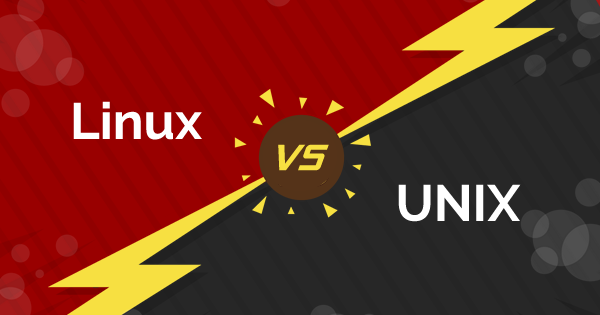Before the invention of Windows and Linux, Unix had a heavy influence in the computing world. In fact, the Linux operating system is a clone of the Unix operating system. With the latest Linux trends, the growth and demand for the Linux operating system have increased a lot. So, in this article, we will see how Linux is different from Unix i.e. Linux vs Unix. Also, we’ll compare Linux and Unix on various grounds.
It all began in 1969 when AT&T developed the first portable operating system UNIX. The Unix OS was completely written in C language allowing instant modification, portability and reaching several platforms. The project run successfully under the leadership of Ken Thompson and became the widely used OS of that time. Most of today’s UNIX variants are the licensed versions and every version has its own unique features, Sun’s Solaris, TBM’s AIX are the most widely used variants of UNIX.
Linux was built by Linus Torvalds in 1991 which was introduced to provide a free alternative to UNIX. When the GNU project was under process in 1983 which aimed to provide a free OS, LINUX was introduced. Unlike UNIX, Linux has the potential to run on several other platforms which the UNIX couldn’t. They both have a common foundation but have different tools and utilities.
A Comparison of Linux and Unix – Linux vs Unix
People are generally confused between Linux and Unix os and a number of questions hover in their minds. Some of the questions are – Are Linux and Unix same? Is Linux OS different from Unix? Is Linux like Unix? and many others. So, as an answer, Linux is a Unix-like operating system with some modifications in the Unix design. There are a number of differences between Unix and Linux, so let’s dive deep into the features of both to understand the difference of Linux vs Unix.
Before moving forward, you can have a quick look at the difference table below:
|
Differences between Linux and Unix |
||
|
Category |
Linux |
Unix |
| Cost | Available freely as it is open-source software. | There are different prices for different Unix OS on the basis of the vendor. |
| Development | Open Source and several communities of developers come across a single platform for the development of Linux. | Developed by AT&T and some other commercial developers. |
| User | Linux has a wide range of users from end-users to developers. | Used in basically servers and large workstations. |
| Text Made Interface | The default shell for Linux is BASH. It also supports multiple command interpreters. | The default shell for UNIX is Bourne. It does not support all software but with time it is becoming compatible with other software. |
| GUI | There are mainly two GUI – KDE and Gnome but has alternatives like Mate, LXDE, etc. | It has a Common Desktop Environment, and also the Gnome. |
| Usage | One can install it on computers, mobile, and tablets as well. | Only works on internet servers, large workstations, and personal computers. |
| Portability | Linux is Portable. | Unix is not Portable. |
| Versions | Some common versions of Linux are – Ubuntu, RedHat, Solaris, OpenSuse, etc. | Some common versions of Unix are AIS, HP-UX, BSD, etc. |
| Source Code | The source code of Linux is available in general public. | The source code of Linux is not available to anyone. |
| Threat Detection | Threat detection and solution is fast as Linux is mainly community-driven. | To get proper bug fixing, users have to wait longer. |
1. Linux vs Unix – User Interface
Linux has more interactive user interface and so, the developers working on Linux will find it difficult to work on any commercial UNIX systems. It is easy to install the sound card, flash player, and other utilities in Linux. Apple OS X is an example of UNIX where it is difficult to install applications from a third party. Both are multiuser OS where UNIX is based on Command Line Interface and Linux is based on Graphics User Interface. But now all modern UNIX systems support GUI as well as CLI.
Some of the popular UNIX OS are HP-UX, IBM AIX, Sun Solaris, and Mac OS X. While some of the top Linux distributions are Redhat Enterprise Linux, Ubuntu, openSUSE, Zorin, and Linux Mint.
2. Linux vs Unix – Usage & Operations
Linux is used from small to medium-sized operations while previously UNIX was the only option. Most of the software vendors have moved to Linux as it is open software which is freely distributed and preferred for web service and office operations.
At most of the places, Linux is used but there are times where UNIX has an advantage. Like in enterprises which make use of massive symmetric multiprocessor systems, UNIX is a great choice to handle the operations. Now, the time has changed and since 2011 Linux is powering 90% of the top 500 servers.
Linux blogs are a good source of information to stay updated about the Linux trends and news. Check the list of the Best Linux Blogs and keep them reading to stay updated.
3. Linux vs Unix – Basic Features
Linux is a kernel and Unix is a standardization. There are a number of features in which both the operating system differs, some of them are below.
UNIX Features:
- It is a multi-user and multi-tasking OS.
- In the servers and workstations, UNIX is used as the master control program.
- Since it was first built so several of the commercial applications are there in the market.
Linux Features:
- It is a multi-tasking OS and also supports multi-user programs.
- One program could have more than one process and each of the processes is capable of having more than one thread.
- In one machine you can install Linux as well as other OS, and both of the OS will run smoothly.
- It has authorized account so individual accounts are secured.
4. Linux vs Unix – Security
There is no OS which is fully secured but if we compare Unix and Linux we see that Linux is far more responsive in dealing with bugs and threats. Both have same characteristics like proper segmentation of the domain in a multi-user environment, there is a password system by which the system is encrypted and so on. The open software system has an advantage that it is freely available and this makes it more secure to bugs. When any of the developers will see a bug in the software he may report it to anyone in the developers’ forum. In the case of Unix, the system is not open software so it has limitations and is far more exposed to threats.
5. Linux vs Unix – Hardware Architecture
If we see the commercial versions of Unix then most of them support their own individual hardware machines. E.g. HP-UX supports only PA-RISC and Itanium machines, Solaris works on SPARC and x86 which is a power processor. These come under the limitations of UNIX and this is the reason Unix vendors have an advantage that they could optimize the code and the drivers.
In the case of Linux, this is not so. Linux has been written so that it could support the maximum number of machines. There are several platforms and machines that can run Linux with the support of several other I/O devices. Here the developers do not know that in which system the software will be installed so they cannot optimize the code.
Also Read: Top 5 Linux Certifications in 2019
6. Linux vs Unix – Kernel
The process involved in patching and compiling is different for Linux and Unix. In Linux, a patch could be released in the forum and the end user has the capacity to install it in their machine. This patch could also be edited and modified by the end-user. As there are many environments which supports Linux applications so developers are dependent on many eyes to know the errors and threats.
The kernels are released only in binary form by the commercial Unix vendors. In case an update has to be installed, then the administrator has to wait for the vendor to release the patch in binary form.
7. Linux vs Unix – File System Support
There are a plethora of filesystems that are supported by Linux whereas in case of Unix it supports less number of systems. Below we will see some of the filesystems supported by the different OS.
Linux – Jfs, Xfs, Btrfs, Ext2, Ext3, Ext4, FAT, FAT32, NTFS, devpts etc.
Unix – ufs, xfs, zfs, jfs, hfs+, hfs, etc.
8. Linux vs Unix – Availability of Applications
As mentioned above, Linux is a clone of Unix. So, many applications are the same between both OS. Some similar commands are cp, ls, vi and cc. Linux is a GNU version whereas Unix is based on original tools. But it is not to be confused as several of the Unix vendors use GNU tools in their installations. Most of the vendors supply these tools as a pre-compiled package which are installed or come as an optional component.
All the Linux distributions come with a set of open source applications and there are several other freely available for the developers and end-users. So Unix also has ported these applications and are available on a commercial version of Unix.
Follow Now: Top Linux Influencers
9. Linux vs Unix – Limitations
While discussing the difference between Unix and Linux, it is important to cover the limitations of both operating systems. Here are the limitations of Linux and Unix.
Limitations of Linux
- Due to patchier support in drivers, there may occur a malfunction for the whole of the system.
- It is not as easy as a user uses windows OS.
- Several of the programs that we run on windows may run in Linux using a complicated emulator.
- Most of the corporate world uses Linux, although a home user could also make use of Linux.
Limitations of Unix
- It has a complicated user interface.
- Linux requires a high-performance machine. It will run slow on the normal machine and PC.
- Shell interface is complicated as as simple error in typing could cause the whole program to be unresponsive.
- It does not have the support of the real-time response.
10. Linux vs Unix – Support
All of the Unix versions are paid and Linux versions are free to use. This also adds a feature to Unix that if anyone purchases Unix, they will get commercial support. In the case of Linux, we have several open forums where the user could ask questions and come up with a better solution. Linux is more responsive as several end users have claimed that the forums are more responsive than commercial technical support of Unix.
Preparing for a Linux interview? Get ready with these top Linux Interview Questions and crack your interview in the first go!
Final Words
There is a huge market for Linux and it is supposed to be constantly growing due to the rich features of Linux. The International Data Corp. (IDC) is in support of Linux and said that there are more than 25 million machines of Linux while Unix has only 5.5 million. The above comparison of Unix vs Linux is really helpful to understand the difference between Unix and Linux os.
Linux is popular among the developers and end-users due to its embedded technology, and open user interface. Unix is also competing with Linux and vendors of Unix such as HP, IBM, Sun has come up with the graphical user interface and user-friendly interface which is also compatible with Linux.
So, if you are a developer or administrator working on Linux os, there are a great number of opportunities for you to get ahead. However, validating your skills with a Linux certification will give your career a new edge. So, enroll now for the Linux certification training courses and start your preparation to become a certified Linux professional.
- Top 20 Questions To Prepare For Certified Kubernetes Administrator Exam - August 16, 2024
- 10 AWS Services to Master for the AWS Developer Associate Exam - August 14, 2024
- Exam Tips for AWS Machine Learning Specialty Certification - August 7, 2024
- Best 15+ AWS Developer Associate hands-on labs in 2024 - July 24, 2024
- Containers vs Virtual Machines: Differences You Should Know - June 24, 2024
- Databricks Launched World’s Most Capable Large Language Model (LLM) - April 26, 2024
- What are the storage options available in Microsoft Azure? - March 14, 2024
- User’s Guide to Getting Started with Google Kubernetes Engine - March 1, 2024





Thanks, Neeru for the nice article. You have provided a very good insight into Linux vs Unix.
Apart from thanking you for the valuable article, I also wanted to point you to a typo in the comparison table (row: Source Code).